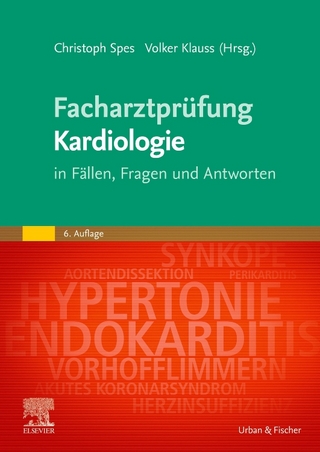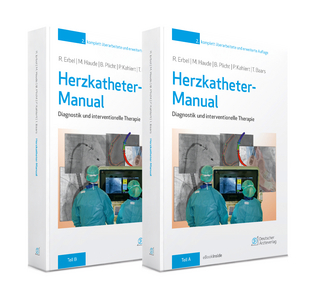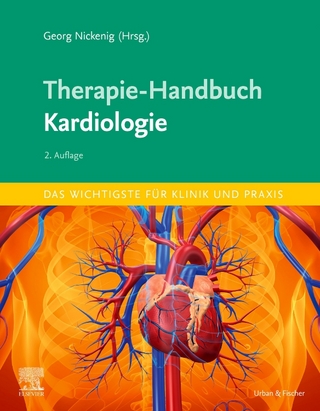
Transcatheter Aortic Valve Replacement Program Development
A Guide for the Heart Team
Seiten
2019
Wolters Kluwer Health (Verlag)
978-1-9751-0522-8 (ISBN)
Wolters Kluwer Health (Verlag)
978-1-9751-0522-8 (ISBN)
Launch and cultivate a successful program for the innovative procedure poised to become the standard for patients with aortic stenosis (AS) with Transcatheter Aortic Valve Replacement (TAVR) Program Development: A Guide for the Heart Team .
Written by leaders in the field, this clinical instruction manual is the first to consolidate evidence, guidelines, and best practices for the TAVR care pathway from referral to follow-up. This is a must-have for clinicians—nurses, physicians, and allied health professionals—as well as administrative leadership and staff involved in TAVR programs.
The text offers a comprehensive view of the TAVR program organized to support staff and quality, and positioned to grow on pace with evolving indications, regulations, technology, and patient needs:
Foundational Knowledge – AS clinical presentation, disease progression, historical perspective and current practice
Multidisciplinary Care – Heart Team, Valve Program Clinician, procedural staff, valve clinic, hospital-based care, partnership with primary care and referring providers
Patient Evaluation – symptoms, medical history, social determinants of health, diagnostic imaging, echocardiography and computerized tomography, risk stratification
Heart Team Shared Decision Making – case selection, real-world patient scenarios for shared decision-making, risk-predictive tools, considerations for specific conditions – anatomical challenges, low-gradient AS, mitral valve disease, frailty, pulmonary disease, kidney disease, dementia
Procedural Care and Clinical Pathways – specific, detailed examples of procedure plans, order sets, emergency planning, peri-procedural communication and handoffs, post-procedure care pathways, discharge planning
Program Optimization and Evaluation – strategies and tactics for education and communication, staffing considerations, wait list management, scheduling challenges, measurement of clinical outcomes, patient experience, adherence to indications, regulatory compliance, quality registry reporting
About the Clinical Editors
Marian C. Hawkey, RN, is Director of TAVR Clinical Research at New York Presbyterian/Columbia University Medical Center in New York City.
Sandra Lauck, PhD, RN, is a scientist at the Centre for Heart Valve Innovation and Clinical Assistant Professor (St Paul’s Hospital and Heart & Stroke Foundation Professorship) in Cardiovascular Nursing at the University of British Columbia in Vancouver.
Elizabeth M. Perpetua, DNP, is Principal Consultant at EMPath Health Services – Perpetua Associates, in Seattle, Washington.
Written by leaders in the field, this clinical instruction manual is the first to consolidate evidence, guidelines, and best practices for the TAVR care pathway from referral to follow-up. This is a must-have for clinicians—nurses, physicians, and allied health professionals—as well as administrative leadership and staff involved in TAVR programs.
The text offers a comprehensive view of the TAVR program organized to support staff and quality, and positioned to grow on pace with evolving indications, regulations, technology, and patient needs:
Foundational Knowledge – AS clinical presentation, disease progression, historical perspective and current practice
Multidisciplinary Care – Heart Team, Valve Program Clinician, procedural staff, valve clinic, hospital-based care, partnership with primary care and referring providers
Patient Evaluation – symptoms, medical history, social determinants of health, diagnostic imaging, echocardiography and computerized tomography, risk stratification
Heart Team Shared Decision Making – case selection, real-world patient scenarios for shared decision-making, risk-predictive tools, considerations for specific conditions – anatomical challenges, low-gradient AS, mitral valve disease, frailty, pulmonary disease, kidney disease, dementia
Procedural Care and Clinical Pathways – specific, detailed examples of procedure plans, order sets, emergency planning, peri-procedural communication and handoffs, post-procedure care pathways, discharge planning
Program Optimization and Evaluation – strategies and tactics for education and communication, staffing considerations, wait list management, scheduling challenges, measurement of clinical outcomes, patient experience, adherence to indications, regulatory compliance, quality registry reporting
About the Clinical Editors
Marian C. Hawkey, RN, is Director of TAVR Clinical Research at New York Presbyterian/Columbia University Medical Center in New York City.
Sandra Lauck, PhD, RN, is a scientist at the Centre for Heart Valve Innovation and Clinical Assistant Professor (St Paul’s Hospital and Heart & Stroke Foundation Professorship) in Cardiovascular Nursing at the University of British Columbia in Vancouver.
Elizabeth M. Perpetua, DNP, is Principal Consultant at EMPath Health Services – Perpetua Associates, in Seattle, Washington.
| Erscheinungsdatum | 10.05.2021 |
|---|---|
| Sprache | englisch |
| Maße | 152 x 229 mm |
| Gewicht | 499 g |
| Themenwelt | Medizinische Fachgebiete ► Innere Medizin ► Kardiologie / Angiologie |
| Pflege ► Fachpflege ► Anästhesie / Intensivmedizin | |
| Medizin / Pharmazie ► Pflege ► Pflegemanagement / Qualität / Recht | |
| ISBN-10 | 1-9751-0522-2 / 1975105222 |
| ISBN-13 | 978-1-9751-0522-8 / 9781975105228 |
| Zustand | Neuware |
| Informationen gemäß Produktsicherheitsverordnung (GPSR) | |
| Haben Sie eine Frage zum Produkt? |
Mehr entdecken
aus dem Bereich
aus dem Bereich
in Fällen, Fragen und Antworten
Buch | Softcover (2024)
Urban & Fischer in Elsevier (Verlag)
89,00 €
Diagnostik und interventionelle Therapie | 2 Bände
Buch (2024)
Deutscher Ärzteverlag
349,99 €


